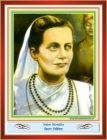₹400








The Master as I Saw Him, is a book famous for its chronicling of intensespiritual experiences from the life of Swami Vivekananda, as noted by his disciple—Sister Nivedita.
The book is written in an easy to read fashion, such that any chapter can be opened and read without losing any continuity. Nevertheless, it has still been assigned an intermediate rating, mainly because the text pre-supposes a familiarity with Swami Vivekananda, India, her religious traditions and historical customs, which new readers having no prior basis may find difficult to understand.
It is important to remember that this book was written over a 100 years ago, and so it presents a view of India of the past - a country tremendously weakened by its deeply entrenched social and religious prejudices such as the caste system, eating of food cooked at the hands of Brahmins only, child-marriage and the low status accorded to women, especially widows.
______________________________________________________________________________________________________________________________________________________________________________________________________________________________________________________________________________________________________________________________________________
Contents
Authors’s Note — 5
1. Swami Vivekananda in London, 1895 — 11
2. Swami Vivekananda in London, 1896 — 19
3. The Conflict of Ideals — 30
4. Swami Vivekananda and the Order of Ramakrishna — 41
5. Wanderings in Northern India — 58
6. The Awakener of Souls — 65
7. Flashes from the Beacon-fire — 70
8. Amarnath — 76
9. Kshir Bhowani — 80
10. Calcutta and the Holy Women — 87
11. The Swami and Motherworship — 100
12. Half-way Across the World — 107
13. Glimpses of the Saints — 114
14. Past and Future in India — 119
15. On Hinduism — 124
16. Glimpses in the West — 132
17. The Swami’s Mission Considered as a Whole — 138
18. Swami Vivekananda and his Attitude to Buddha — 151
19. The Swami’s Estimate of Historic Christianity — 163
20. Woman and the People — 168
21. His Method of Training a Western Worker — 180
22. Monasticism and Marriage — 191
23. Our Master’s Relation to Psychic Phenomena So- — called — 202
24. The Swami’s Teaching About Death — 210
25. Super-consciousness — 222
26. The Passing of the Swami — 232
27. The End — 238

Sister Nivedita, born Margaret Elizabeth Noble, was a Scots-Irish social worker, author, teacher and disciple of Swami Vivekananda. She met Vivekananda in 1895 in London when she was thirty years old, and this courageous daughter of the West, sailed thousands of miles across to Calcutta, India, (present-day Kolkata) in 1898. She took to monasticism. Swami Vivekananda gave her the name Nivedita (meaning “Dedicated to God”) when he initiated her into the vow of Brahmacharya on March 25, 1898. She was closelyassociated with the newly established Ramakrishna Mission. However because of her active contribution in the field of Indian Nationalism, she had to publicly dissociate herself from the activities of the Mission on the insistence of the then president Swami Brahmananda. She was very close toSarada Devi, the spiritual consort of Sri Ramakrishna and one of the major influences behind Ramakrishna Mission; and also with all brother disciples of Swami Vivekananda. She came to assist Swami Vivekananda in his work of setting up an educational institution for women in India.Nivedita died at dawn on October 13, 1911, when she was just forty-three, in Roy Villa Darjeeling. Her epitaph aptly reads: ‘Here reposes Sister Nivedita who gave her all to India’.